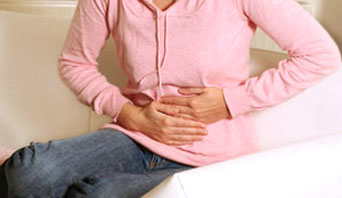A lot of women, especially those suffering from obesity, face symptoms of cysts on ovaries. Ovarian cysts are common among women of various reproductive ages. There may be various kinds of ovarian cysts symptoms, although the most common one is when the follicles stay closed in the ovulatory phase, instead of releasing eggs. While most of the cysts are fluid filled and benign, others may be cancerous.
Some of the common symptoms indicating the presence of ovarian cysts include:
 Pain: Cysts in the ovary may lead to repeated pain in the lower back or pelvic region. The pain can be augmented by bowel movements, menstrual periods and intercourse.
Pain: Cysts in the ovary may lead to repeated pain in the lower back or pelvic region. The pain can be augmented by bowel movements, menstrual periods and intercourse.
- Size or bloating: Women with cysts in the ovaries may experience a sense of fullness. They may also report abdominal distention with the gradual growth of the cyst.
- Irregularity of menstruation: Missed, late or irregular periods may be caused by ovarian cysts. They may even lead to heavy bleeding than usual during menstruation and bleeding between your periods.
It should be remembered that many women may not experience any symptoms of cysts on ovaries. This can be treated by undergoing pelvic examinations on a regular basis which is best for early detection. Certain ovarian cysts which are caused as a result of polycystic ovary syndrome (which leads to the formation of smaller ovarian cysts) and endometriosis (tissue that grows outside the uterus) may lead to infertility.
Identification of symptoms of cysts on ovaries
Cysts look like blisters. They may exist in any region of the body. Functional cysts which occur as a result of any usual physical process generally disappear with menstruation over a couple of months.
The various kinds of cysts include corpus luteum, follicular, dermoid, polycystic ovarian, cystadenoma and endometrioma. Here are various ways of identifying the symptoms of cysts on ovaries:
- You may notice abnormalities during menstruation such as pain during certain days, absence of or irregular periods. Sometimes, the amount of blood lost may be severe or negligible.
- Check for any periodic or steady uneasiness or moderate ache near the pelvic region. The pain may usually move to the thighs or lower back.
- Is there pain after or during sexual intercourse?
- Symptoms such as little inflammation on your lower abdomen or a heavy sensation in the pelvis or stomach may exist. You may experience irregular bladder or bowel movements on the basis of location and size of the cyst, as well as the extent of pressure caused. At times, you will feel as if you are not able to urinate fully.
- There may be hair or abnormal growths on your body, problems relating to acne, nausea (as during pregnancy) and painful feeling in your breasts.
- Have you experienced abnormal weight gain during a brief period?
- You may experience symptoms like deepening of voice, growth of facial hair, male characteristics and baldness, among others.
- Some signs may comprise vomiting, fever, sudden pain or bleeding in the abdomen, increased breath, considerable weakness or giddiness.
You should be quick in identifying the symptoms of cysts on ovaries and get diagnosis and appropriate medical care.


